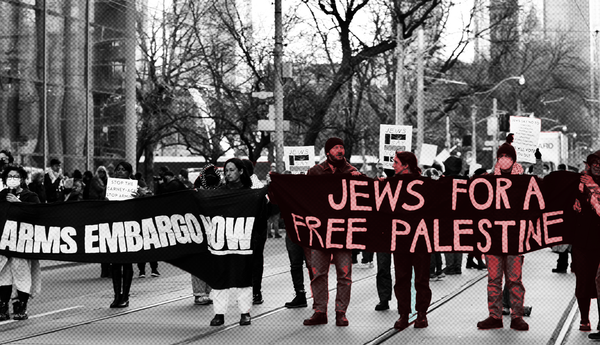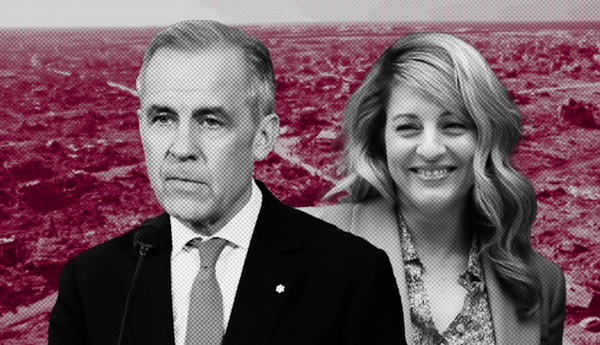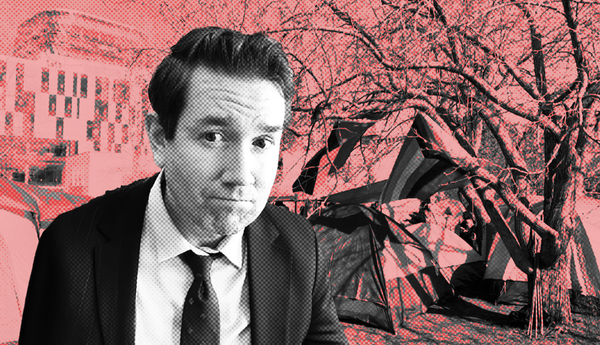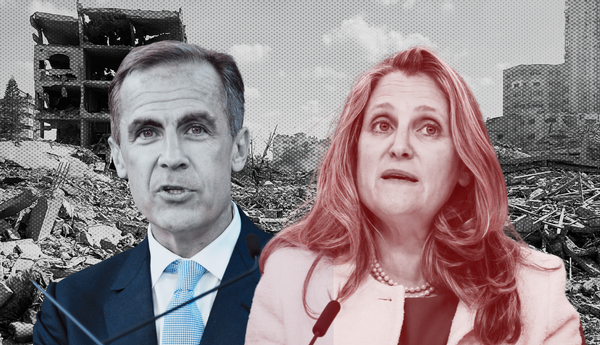Palestine solidarity activists are warning that campus democracy and freedom of conscience in Canada are under threat, although perhaps not in a way that most might expect.
In late July, McGill University student Jonah Fried launched a lawsuit against his university, his student union and a pro-Palestinian campus organization. He alleges that the organizations named in the lawsuit have made him and other Jewish students on campus feel unsafe and unwelcome through what the lawsuit calls “repeated anti-Israel referendums.”
With the financial backing of B’nai Brith Canada, a pro-Israel lobby group, Fried filed the lawsuit following the Student Society of McGill University’s (SSMU) moves towards adopting a Palestine solidarity policy that received 71 percent approval in a campus-wide referendum.
That late-March referendum —which Fried reportedly attempted to block— pertained to a resolution that encouraged McGill’s student society to boycott and divest from “corporations and institutions complicit in settler-colonial apartheid against Palestinians,” and for McGill University to do the same.
The solidarity policy also committed SSMU to making “at least one public statement each semester, including a statement on Nakba Day, reaffirming the SSMU’s solidarity with Palestinian students and with Palestinian liberation from settler-colonial apartheid.”
The student-led effort to pass the resolution has been ongoing for about six years. In 2016, Solidarity for Palestinian Human Rights McGill (SPHR) passed a boycott, divest, and sanctions (BDS) motion at SSMU’s general assembly.
However, the motion was not ratified. At the time and in the year preceding, the effort was condemned both by McGill principal Suzanne Fortier and Justin Trudeau. Later in 2016, the SSMU judicial board decided the motion was unconstitutional because it demanded action against a specific country.
In January 2021, however, the SSMU judicial board determined that the student society may take positions supportive of Palestinian liberation. Later that spring, the judicial board determined that the services and clubs of SSMU could support BDS, and that doing so did not contravene either SSMU’s constitution or its equity policy.
In May 2021, SPHR circulated a petition asking McGill to divest from doing business with Israeli companies that fund and profit from the expansion of illegal settlements in occupied Palestine, and to include Zionism as racist in terms of the university’s definition of discrimination. This was condemned by the administration in a mass email.
In March this year, the Palestine solidarity policy was initially removed from the referendum ballot on the first day of voting, but was replaced the next day. With 16.5 percent of the student body turning out, a majority voted in favour.
The university then issued a statement indicating it would terminate its agreement with the student society after finding that the policy was in violation of SSMU’s constitution. In April, SSMU’s board of directors determined the Palestine solidarity policy didn’t conform to the society’s constitution, equity policy, other internal precedents and Quebec law. Accordingly, the board of directors decided not to ratify the policy.
Meanwhile, B’nai Brith’s lawsuit has not gone unnoticed. Palestine human rights activist, musician and Pink Floyd co-founder Roger Waters said in an interview with The Maple that such tactics are standard procedure for the Israel lobby, particularly B’nai Brith, which has been critical of Waters for years.
“I think they're losing ground hand over fist,” said Waters. “I think people are less and less inclined to buy their bullshit, and that's why I responded to the call from the students at McGill a couple of weeks ago.”
Waters rallied in support of McGill students campaigning in solidarity with Palestinian human rights last month.
“Students and others are shining a light on the calumny of the Israeli occupation of Palestine, and [pro-Israel activists] want to switch the light off, and so they're using any means that they can to do so,” he continued. “I think the hope always is that [the lobby groups] will have deeper pockets than the students.”
McGill, like many Canadian institutions and levels of government, has adopted the contentious International Holocaust Remembrance Alliance (IHRA) definition of antisemitism, which critics charge conflates Judaism with Zionism and posits the state of Israel in its current form (including the occupied Palestinian territories) as constituting the self-determination of all Jews, a position rejected by many progressive Jewish organizations, such as Independent Jewish Voices - Canada.
Governments and institutions that have adopted this interpretation tend to view the BDS movement as antisemitic, although this claim has been rejected by experts and advocates.
Michael Bueckert, vice president of Canadians for Justice and Peace in the Middle East (CJPME), told The Maple that criticism of the actions of the government of Israel is not the same thing as hatred of Jewish people.
“BDS is a call from Palestinian civil society, calling on the international community to take up various forms of economic pressure in order to to push the Israeli government to respect international law,” explained Bueckert.
“Some of those forms of pressure include boycotts, which are things that consumers can do, and divestment, which is something that can be done by universities, by churches, by labour unions, and other institutions.”
Bueckert noted that the BDS movement also calls for government sanctions. All of these different pressures, he explained, are aimed at supporting Palestinian rights in the face of Israeli occupation and apartheid.
Bueckert noted that “apartheid” not only describes the system of racial oppression imposed by the white minority population of South Africa onto that country between 1948 and 1994, but is also an accepted legal term under international law that is applicable to situations similar, though not identical, to the policies instituted in South Africa.
“When that call came from Palestinian civil society in the early 2000s, they modelled their call explicitly after the international anti-apartheid movement in the 1970s and 1980s,” said Bueckert. “When the African National Congress was calling on people around the world to boycott the apartheid regime in South Africa, [it was] using the exact same tactics of boycotting, divesting and sanctioning.”
Three major human rights organizations — Amnesty International, Human Rights Watch and B’Tselem —have in the past two years concluded that Israel is committing the crime of apartheid in all areas under its control.
“What this means is that within the area under Israeli control, there is an intent to dominate the Palestinian population and to oppress that population in order to benefit Jewish Israelis,” said Bueckert.
In 2020, an article in the Harvard Law Review also weighed in on the matter of tactics used to put pressure on Israel, and concluded that BDS cannot be considered discriminatory in any way based on nationality.
When asked for comment about the lawsuit, a spokesperson for SPHR told The Maple in a statement:
“The SSMU board of directors already overturned the Palestine Solidarity Policy in April, due to pressure from the McGill administration … The explicit purpose of the lawsuit is simply to punish McGill students for engaging in anti-colonial politics, and constitutes the latest desperate attempt to crush the rising, overwhelming support for the Palestine solidarity movement at McGill and beyond.”
Repeated emails to SSMU from The Maple were not returned. A spokesperson for the university responded to an interview request with a statement indicating that the university would not discuss any matter before the court. B’nai Brith did not respond to multiple requests for comment.
Bueckert isn’t surprised by McGill’s actions, saying the university was hardly at the forefront of anti-apartheid activism during the 1970s and 1980s.
“In the 1980s, McGill was strongly opposed to BDS-styled efforts by McGill students who opposed apartheid,” he explained. “It tried to shut down any attempts to get the university to divest from South Africa.”
It took approximately six years before the university responded to demands from McGill students to divest from any direct business dealings with apartheid South Africa, and to divest from corporations the university had invested in that were maintaining business relations with South Africa. However, the protest actions eventually succeeded.
For his part, Waters is optimistic about the future of advocating for Palestinian human rights, despite the efforts of B’nai Brith.
“This is the dying move of a defunct organization that nobody should listen to for even 10 seconds,” he said. “[The state of Israel] should be brought to the table — forced, if necessary — by the weight of popular opinion in civil society all over the globe to have the conversation and to remedy the situation, and the remedy, almost certainly, will be a single, genuinely democratic state.”
Taylor C. Noakes is an independent journalist and public historian from Montreal.
Go deeper
Here are a few stories from our archive that expand on today's story
Canadian Diplomats Flagged Israel’s Poor Record of Investigating Attacks on Journalists After Reporter’s Death
Shortly after Israeli forces shot and killed Palestinian journalist Shireen Abu Akleh in May, senior Global Affairs Canada (GAC) staff received a report from Canada's diplomatic office in Ramallah noting that Israel has a long track record of failing to properly investigate when its security forces attack reporters.
Canadian Jewish Group Launches Campaign Against Israeli Apartheid
The group Independent Jewish Voices Canada (IJV) launched a new campaign Monday to “end Israel’s oppression against Palestinians” following a recent Amnesty International report that found Israel is committing the crime of apartheid against Palestinians.
Canadian Government Called Out Over Response to Israel’s Latest Attack on Gaza
The Canadian government is being called out for issuing statements defending Israel’s use of force "to assure its own security" following recent Israeli airstrikes on Gaza that killed dozens of Palestinians, including children.
Top Maple story this week
Ford Government Unveils Plan to Increase Surgeries Provided at Private Clinics

Ontario Health Minister Sylvia Jones announced last week her government’s plan to increase the number of publicly covered surgeries provided at private clinics – amid an ongoing crisis in the province’s health system – along with other measures that the government suggests will ease public health pressures.
On the latest episode of The Maple’s North Untapped podcast, we spoke to Dr. Amit Arya – a palliative care physician and board member of Canadian Doctors for Medicare – about the announcement, as well as the Doug Ford government's broader plans to potentially further privatize Ontario's public health system.
Download the full episode on Apple,Spotify or Google, and help us reach an even bigger audience by giving us a five-star rating on Apple podcasts!
Catch up on our latest stories
- Understanding Canada’s Counterinsurgent ‘Peacekeeping.’
- Understanding Canada’s Muted Response to Israel’s Recent Attacks on Gaza.
- Interview: Anjali Appadurai’s Challenge to the Status Quo.







